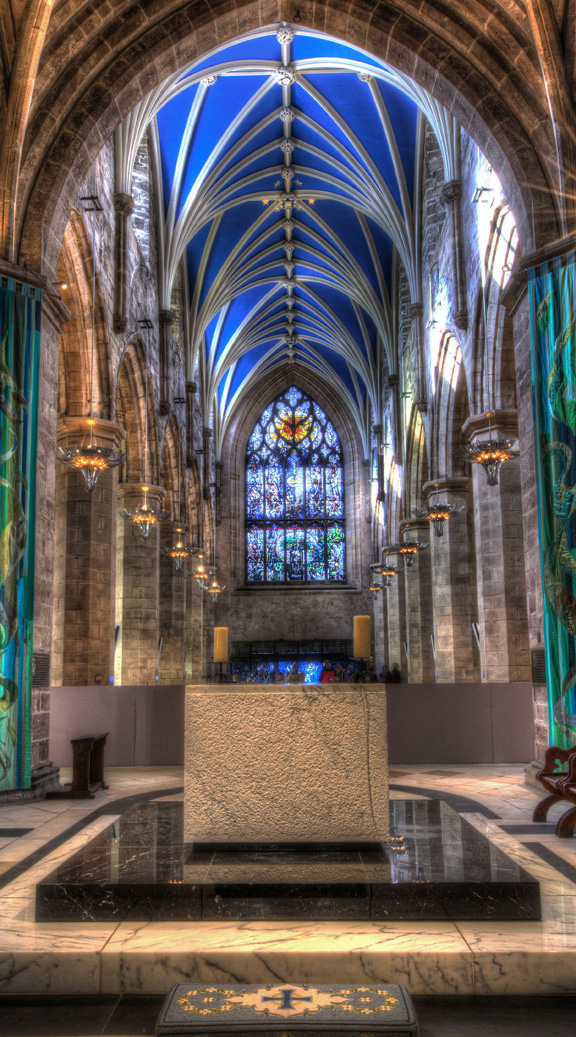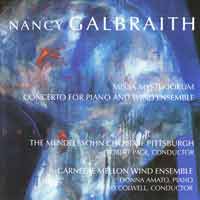| composer: |
Nancy Galbraith (1999) |
 |
| author: |
traditional; from the Ordinary of the Mass |
| genre: |
concert choir & wind ensemble OR orchestra |
| length: |
5 movements, 45:00 minutes |
| publisher: |
Subito Music Publishing (ASCAP)
60 Depot Street, Verona, NJ 07044
mail@subitomusic.com • 973-857-3440 |
orchestration: |
SATB(div); 2fl(pic), 2ob, 3cl, b-cl, 2bn;
3tpt, 4hn, 2tbn, b-tbn, tba; vcl, cb; hrp, pno, org; 4perc |
| audio/video: |

 |
|
| movements: |
1. Kyrie
2. Gloria
3. Credo
4. Sanctus
5. Agnus Dei |
| world premiere: |
20 November 1999
Mendelssohn Choir of Pittsburgh • Robert Page, music director
Carnegie Music Hall, Pittsburgh, Pennsylvania |
| program notes: |
Nancy Galbraith’s Mass moves fluidly through extraordinary ranges of dynamics and emotions. Kyrie begins plaintively, then steadily swells to a resounding cry for mercy. This release of tension leads to a contrapuntal descent to low bass and chimes, followed by the movement’s only two occurrences of “Christe eleison” - the first a whisper, the second a primal scream! Gloria opens with an explosion of fervent praise, switches gears to a staccato “et in terra pax…” section, and again to a cool 8-part choral chant of “Agnus Dei Filius Patri…,” then closes with a rousing return to the rapturous opening chorus. Credo unfolds with a timeless sacred incantation that evolves into six-part chordal chant. The monastic air gives way to the dualistic dramatic climax of the Mass - the tragic crucifixion, and exultant resurrection - then returns abruptly to simple plainsong and a heartfelt “Amen.” Sanctus marks the joyous high point of this Mass, with rich homophonic choral swells accompanied by rhythmic winds and percussion. The movement’s interior features the Benedictus sung by a vocal quartet accompanied by lush choral textures. Agnus Dei floats airily through nocturnal moods of tranquillity, mystery, and meditation, to a quiet dismissal. |
| composer's note: |
While writing "Missa Mysteriorum" (Mass of the Mysteries), my thought was to combine my experience as a church musician with my experience as a composer of postmodern contemporary art music. The result reveals traditional sounding melodies that are often accompanied by instrumental textures formed through the polyphonic layering of several rhythmic motives and the occasional use of minimalist techniques. —N.G. |
| definition: |
The performance of Galbraith's "Missa Mysteriorum" emerges from a centuries-long tradition of the choral setting of the Mass. The word “missa” is the Latin word for "dismissal.” It is an excellent summary term for a worship form whose primary purpose is to send Christian believers into the world prepared to re-enact in their lives the patterns of the life, death and resurrection of Jesus Christ. Often these human reflections of God’s power and presence are termed “mysteries.” The word does not indicate the more common meanings of the eerie or the inscrutable. Instead it indicates a paradox: God operates in the world and the community of the faithful in both profoundly hidden and yet obvious ways.
—Dr. Susan Karen Hedahl, Lutheran Theological Seminary at Gettysburg |
| press bytes: |
... both spiritual and radiant, with an immediacy that can't be ignored.
—Pittsburgh Post-Gazette
"The Mass is one of Galbraith's most ambitious works to date, and simultaneously one of her finest and most immediately appealing. The composer's idiom of choice is a postmodern blend of twentieth-century styles, richly tonal and modal, and rhythmically vital, with nods in the direction of minimalism and neoromanticism."
—Records International
"CollegiumUSA is proud to present this wonderful recording of Galbraith's Missa Mysteriorum. For those who may be hesitant to explore contemporary music, HAVE NO FEAR. Galbraith's work possesses genuine melody, with a sweeping American character—at time, almost cinematic in their arc; her harmonies are transparent and attractive; and her propulsive rhythms are reminiscent of the music of John Adams (El Niño, The Chairman Dances, etc.) and Michael Nyman (The Piano)." —CollegiumUSA |

